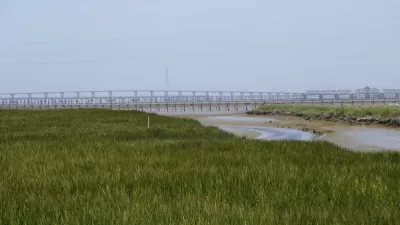President Obama has signed "a bipartisan $12.3 billion water bill that will help improve harbors, waterways, levees, and ecosystems across the United States," according to an article by Adie Tomer and Joseph Kane.
"While the Water Resources Reform and Development Act (WRRDA) addresses a number of policies such as municipal water finance, it also marks an important step in establishing a national freight policy," write Tomer and Kane.
"The biggest freight reform targets the Harbor Maintenance Trust Fund (HMTF), which helps ports maintain their current infrastructure. The new law ensures all user fees will now go back to the nation’s harbors by 2024; the HMTF had been regularly raided for other activities in the past."
One of the highlights of the bill's additional focus on inland waterways is the fast-tracking of the long-delayed Olmsted Locks project on the Ohio River. "In addition, by laying out other reforms like financial reporting requirements and risk-based cost estimates, the bill aims to accelerate the completion of many other projects, helping businesses and households in major inland water markets like Cincinnati, St. Louis, and Memphis realize long-term economic benefits."
The article also includes some criticism of the bill, saying it ignores the economies of scale of U.S. port activities.
FULL STORY: Water Resources Bill: What It Means for Ports and Place in American Freight Policy

Study: Maui’s Plan to Convert Vacation Rentals to Long-Term Housing Could Cause Nearly $1 Billion Economic Loss
The plan would reduce visitor accommodation by 25,% resulting in 1,900 jobs lost.

North Texas Transit Leaders Tout Benefits of TOD for Growing Region
At a summit focused on transit-oriented development, policymakers discussed how North Texas’ expanded light rail system can serve as a tool for economic growth.

Why Should We Subsidize Public Transportation?
Many public transit agencies face financial stress due to rising costs, declining fare revenue, and declining subsidies. Transit advocates must provide a strong business case for increasing public transit funding.

How to Make US Trains Faster
Changes to boarding platforms and a switch to electric trains could improve U.S. passenger rail service without the added cost of high-speed rail.

Columbia’s Revitalized ‘Loop’ Is a Hub for Local Entrepreneurs
A focus on small businesses is helping a commercial corridor in Columbia, Missouri thrive.

Invasive Insect Threatens Minnesota’s Ash Forests
The Emerald Ash Borer is a rapidly spreading invasive pest threatening Minnesota’s ash trees, and homeowners are encouraged to plant diverse replacement species, avoid moving ash firewood, and monitor for signs of infestation.
Urban Design for Planners 1: Software Tools
This six-course series explores essential urban design concepts using open source software and equips planners with the tools they need to participate fully in the urban design process.
Planning for Universal Design
Learn the tools for implementing Universal Design in planning regulations.
Ascent Environmental
Borough of Carlisle
Institute for Housing and Urban Development Studies (IHS)
City of Grandview
Harvard GSD Executive Education
Toledo-Lucas County Plan Commissions
Salt Lake City
NYU Wagner Graduate School of Public Service



























